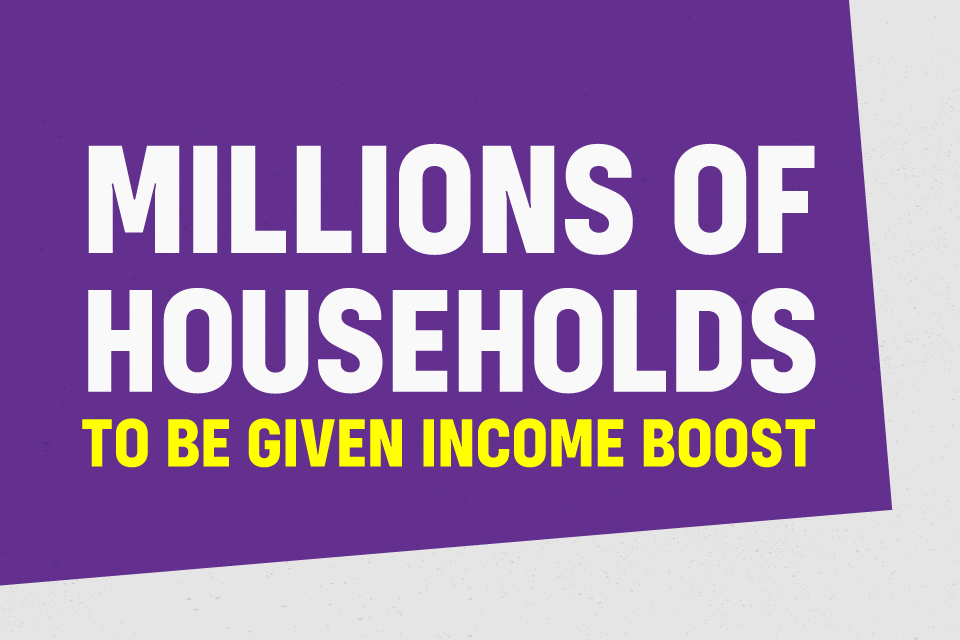Income Boost for Millions as Bill Advances in Parliament
Nearly 4 million households will see an annual income boost estimated to be worth £725 cash as a Bill to overhaul the welfare system completes the next stage of its passage through Parliament.
- Bill to introduce biggest permanent boost to out-of-work support since 1980 progresses through Parliament.
- Legislation will remove perverse disincentives to work that exist in the welfare system while protecting 200,000 of those with the most severe, lifelong conditions who are not expected to ever be able to work.
- Alongside the Bill, disabled people and those with health conditions will have legal protections to try work without fear of reassessment.
- Reforms to the welfare system aimed at improving living standards across the country and breaking down barriers to opportunity as part of the Government’s Plan for Change.
Nearly 4 million households will see an annual income boost estimated to be worth £725 cash as a Bill to overhaul the welfare system completes the next stage of its passage through Parliament.
For the first time ever, the Universal Credit standard allowance will permanently rise above inflation, amounting to £725 by 2029/30 in cash terms for a single person aged 25 or over.
This is the highest permanent real terms increase to the main rate of out-of-work support since 1980, according to the IFS.
Reforms set out in the Universal Credit Bill will look to rebalance the core payment and health top up in Universal Credit (UC). This will address the fundamental imbalance in the system which creates perverse incentives that drive people into dependency.
The Bill, which will legislate to make these changes, today successfully cleared the House of Commons. It will now be introduced into the House of Lords to continue its passage through Parliament towards Royal Assent.
Alongside these changes, we have published significant new measures, giving people receiving health and disability benefits the right to try work without fear of reassessment.
The new Right to Try Guarantee enshrines this in law for the first time and includes disabled people and people with health conditions – such as those recovering from illness – who want to return to work now their health has improved.
Work and Pensions Secretary Liz Kendall said:
Our reforms are built on the principle of fairness, fixing a system that for too long has left people trapped in a cycle of dependence.
We are giving extra support to millions of households across the country, while offering disabled people the chance to work without fear of the repercussions if things don’t work out.
These reforms will change the lives of people across the country, so they have a real chance for a better future.
As part of our commitment to protect the most vulnerable and severely disabled, 200,000 in the Severe Conditions Criteria group – individuals with the most severe, lifelong conditions who are unlikely to recover – will not be called for a UC reassessment.
All existing recipients of the UC health element and new customers with 12 months or less to live or who meet the Severe Conditions Criteria will also see their standard allowance combined with their UC health element rise at least in line with inflation every year from 2026/27 to 2029/30.This means they can live with dignity and security, knowing the reforms to the welfare system mean it will always be there to support them.
We are also putting disabled people at the heart of a ministerial review of the Personal Independence Payment (PIP) assessment led by Disability Minister Stephen Timms and co-produced with disabled people, along with the organisations that represent them, experts, MPs and other stakeholders – making sure it is fair and fit for the future.
We will be engaging widely over the summer to design the process for the review and consider how it can best be co-produced to ensure that expertise from a range of different perspectives is drawn upon.
These reforms are underpinned by a major investment in employment support for sick and disabled people – worth £3.8 billion over the Parliament. Funding will be brought forward for tailored employment, health and skills support to help disabled people and those with health conditions get into work as part of our Pathways to Work guarantee.
This investment will accelerate the pace of new investments in employment support programmes, building on and learning from successes such as the Connect to Work programme, which are already rolling out to provide disabled people and people with health conditions with one-to-one support at the point when they feel ready to work.
The reforms build on the Get Britain Working White Paper that will overhaul Jobcentres, empower Mayors and local leaders to tackle inactivity, and deliver a Youth Guarantee so every young person is either earning or learning, as part of the Government’s ambition to deliver an 80% employment rate.
https://www.gov.uk/government/news/millions-of-households-to-be-given-income-boost-as-bill-progresses-through-parliament
View Original | AusPol.co Disclaimer
